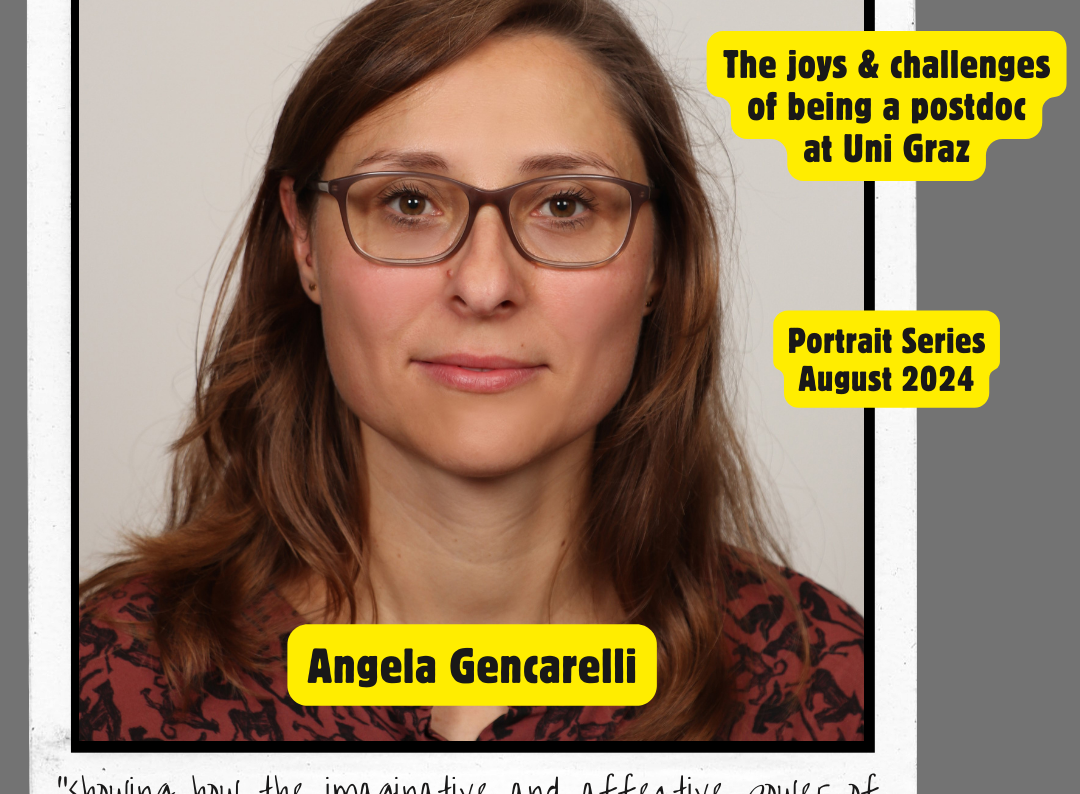This summer, you have the opportunity to get to know some of the brilliant postdoctoral researchers at our university. Our portrait series highlights the diversity within this group of University of Graz research talents - and obviously the fascinating research that they do.
Here are four questions for…
Angela Gencarelli, Centre for Cultural Studies
1) Tell us a little about yourself, and your journey to become a researcher at Uni Graz.
My name is Angela Gencarelli, and I am really passionate about working in academia, especially at Graz University. My family and professional roots lie in Germany and Italy, and I am currently working as a postdoctoral researcher at the Centre for Cultural Studies at the University of Graz. I am a scholar of German studies with a strong focus on cultural studies and interdisciplinarity. I am concerned, for example, with the mutual inspiration of physics and literature. In addition, I am interested in how literary genres are ‘made’ by various actors in the literary industry. But what fascinates me most is the question of what role the supposedly ‘soft’ cultural technique of storytelling plays precisely in the supposedly ‘hard’ natural sciences.
Just as important to me as the dialogue with different disciplines is research experience in various national and international contexts: I studied German literature, modern history and sociology in Potsdam and Manchester and then completed my PhD in Modern German Literature at the Universities of Bonn and Florence as a scholarship holder of an international doctoral programme. After my PhD, I worked as a postdoctoral researcher in literary and cultural studies at the University of Luneburg until I decided to do a DAAD-funded research stay at the Centre for Cultural Studies in Graz. I knew the Centre from an impressive conference which – like the Centre itself – was interdisciplinary in nature and dealt with the basic concept of ‘text’ as a key transdisciplinary category. During the conference, I had the idea of coming to Graz as a fellow and successfully applied for a scholarship. Since October 2021 I have been working as a university assistant at the Centre.
2) What are you currently researching, and why do you think it is important (or interesting)?
I am currently concentrating entirely on completing my habilitation – I am writing a book on the intriguing and little-researched genre of bestiaries (Latin bestia = (wild) animal). This genre which portrays animals in text and image was widespread in the High Middle Ages, but then disappeared for several centuries only to experience an astonishing revival in several European literatures since the beginning of the 20th century. Bestiaries reflect fundamental changes in the view of nature and the world in the Middle Ages and in modernity and therefore urgently need to be researched as an important genre of literary and cultural history.
This project has also given rise to one of my most recent research foci, which is located in ecocritical literary studies: it is remarkable that the current mass extinction of animals and plants has found a strong resonance not only in the media, but also in contemporary literature. In this context, I would like to show that literature in particular, due to its imaginative and affective power, contributes significantly to sensitising the earth’s inhabitants to the often silent and unnoticed extinction of over 27,000 animal and plant species per year if not to activating an ecologically sustainable change in behaviour.
3) What gives you joy in your everyday work life & what are some challenges?
Every day I am enthusiastic about acquiring new knowledge and insights, both by reading literature, which I see as a medium of knowledge (!), and by engaging with books from different scientific disciplines. My working environment gives me a lot of freedom to pursue my academic interests, to develop creativity in thinking, writing and teaching, to maintain interdisciplinary dialogues and collaborations or to explore new research topics. For me, as probably for most of the researchers with temporary contracts, the biggest challenge is that careers in academia are associated with so much uncertainty. I am convinced that all those who are passionate about their work – and I count myself among them – would be no less committed if they had the prospect of long-term employment and projectable career perspectives.
4) What's next for you this year/next year?
This year, I will be completing my habilitation in order to qualify for a professorship. I will also be applying for third-party funding: I have been working on two other research projects in addition to my habilitation for some time now. Firstly, I am focussing on a literary history of biodiversity, including the aforementioned dramatic loss of flora and fauna variety. Secondly, I am passionate about researching the question of how scientific knowledge is shaped rhetorically, argumentatively and narratively. I would like to bring both projects to the application stage next year and submit them to a national and/or international science funding organisation. So, there is still a lot to do after my habilitation, which I am very much looking forward to!
Questions: Johanna Stadlbauer July 2024
Picture credit: Gencarelli/privat
- P.S. You can read every portrait in this interview series with Uni Graz postdocs right now!
